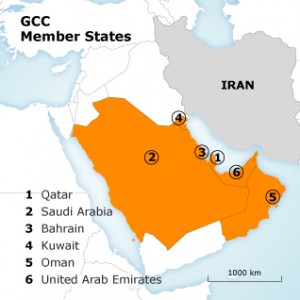Special to WorldTribune.com
WASHINGTON — The unprecedented crisis among the Gulf Arab states threatens U.S. military support to its Arab allies, a report said.
The Washington Institute for Near East Policy said the confrontation between three Gulf Cooperation Council states and Qatar would “complicate” efforts by the United States to integrate Gulf Arab strategy.
 The implications of the GCC crisis with Qatar over its support for the Muslim Brotherhood and Hizbullah are far-reaching, the report said.
The implications of the GCC crisis with Qatar over its support for the Muslim Brotherhood and Hizbullah are far-reaching, the report said.
After six months of waiting for a change under Emir Tamim, Bahrain, Qatar and Saudi Arabia have concluded that Qatar was firmly in Iran’s orbit. The withdrawal of ambassadors from Doha signals the virtual end of the GCC as an alliance headed by Riyad.
In the report, the institute said Qatar, opposed by Bahrain, Saudi Arabia and the United Arab Emirates, has demonstrated resistance to an expanded U.S. military deployment in the emirate.
“Yet Qatar has apparently constrained U.S. deployments intended to deter Iran,” the report, titled “Gulf Arabs In Crisis,” said. “Last year, the United States deployed F-22s to the UAE instead, which is less nuanced in its views of Iran’s capability for mischief.”
On March 4, Bahrain, Saudi Arabia and the UAE withdrew their ambassadors from Qatar to protect its refusal to end support for the Muslim Brotherhood and the Iranian-sponsored Hizbullah. Report author Simon Henderson said the GCC crisis, known in advance by Washington, would be placed on the agenda of the visit to Riyad by President Barack Obama on March 27.
“…[This] very public GCC rift is a setback to U.S. diplomacy with its
Gulf allies and another item for the president’s upcoming meeting with Saudi
King Abdullah, the council’s unofficial leader,” the report said.
The report said the GCC crisis undermined assessments that Qatar’s new
Emir Tamim, appointed in June 2013, would move closer to Saudi Arabia.
Tamim’s first official act was to dismiss his powerful prime minister, Hamad
Bin Jassam Al Thani, deemed as the architect of Qatar’s pro-Brotherhood
policy.
“At the time, analysts believed Sheik Tamim would be more of a team
player with the GCC, but this does not seem to be the case,” the report
said.
The report said Doha has not changed its ambivalence toward the United
States. Henderson, regarded as a specialist on the GCC, said Doha maintained
a relationship with Iran, greatly influenced on their shared natural gas
resources.
“Qatar also continues to use its Al Jazeera satellite television network
as an important tool of soft diplomacy — one that has undermined U.S.
positions in the past,” the report said.
Source Article from http://www.worldtribune.com/2014/03/09/breaking-bad-qatar-splits-with-gulf-neighbors-over-iran-in-blow-to-u-s-strategy/
Views: 0
 RSS Feed
RSS Feed

















 March 10th, 2014
March 10th, 2014  FAKE NEWS for the Zionist agenda
FAKE NEWS for the Zionist agenda 

 Posted in
Posted in 
















